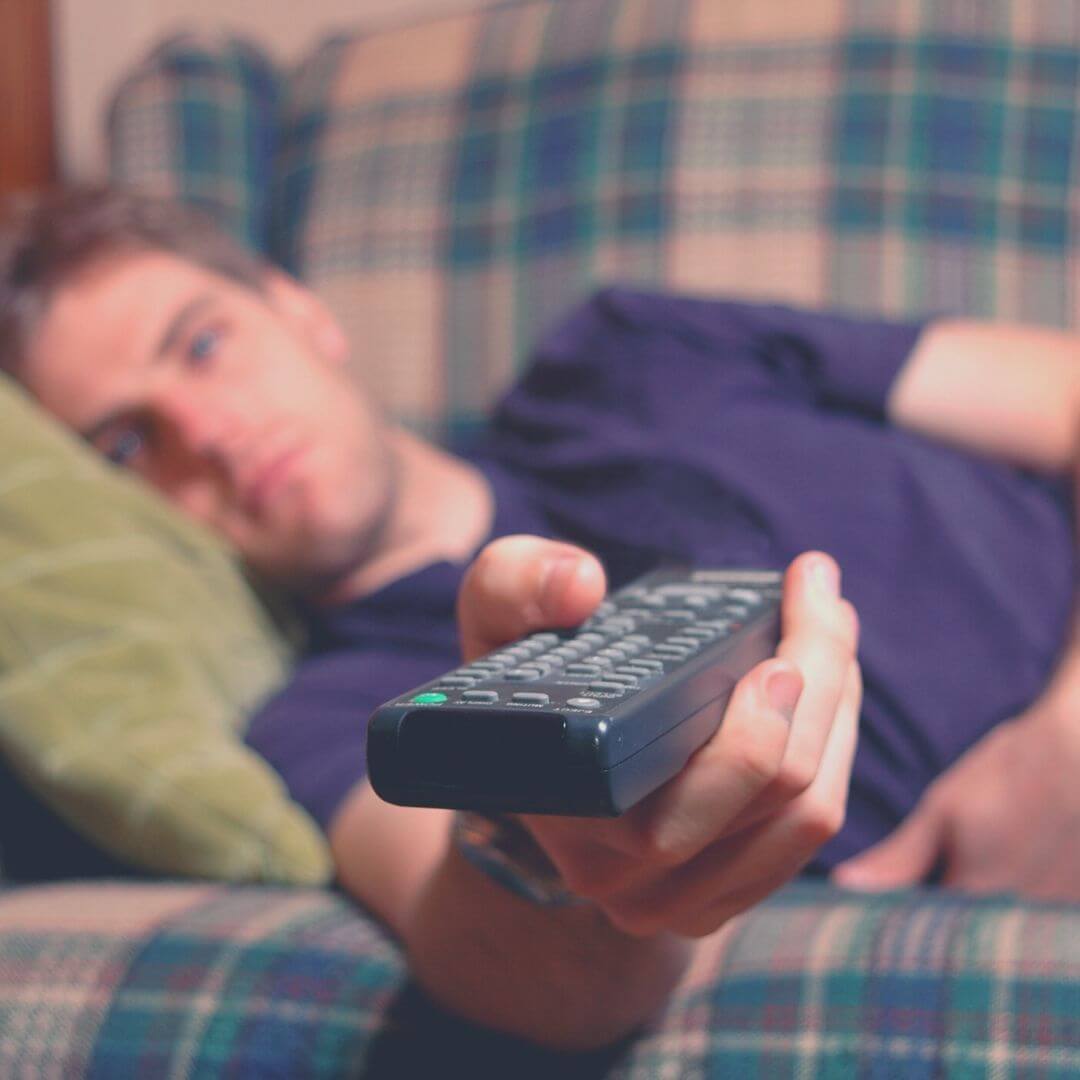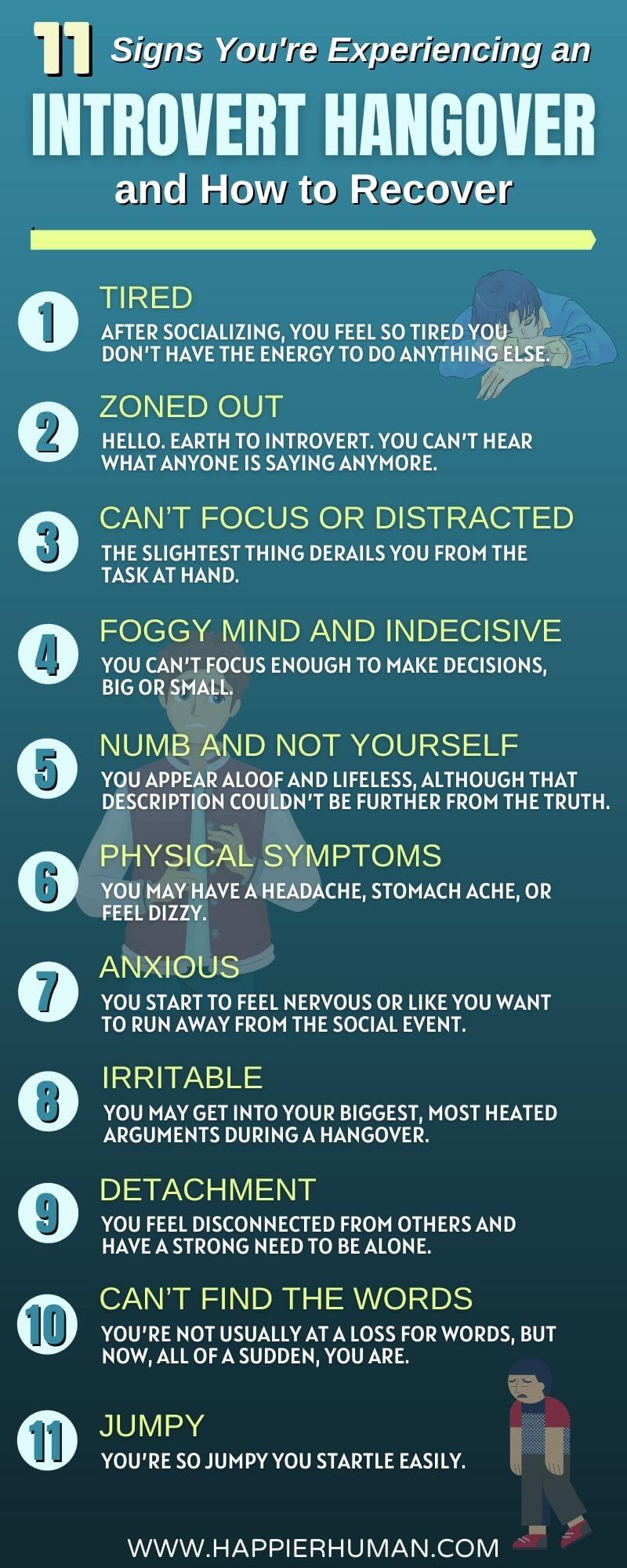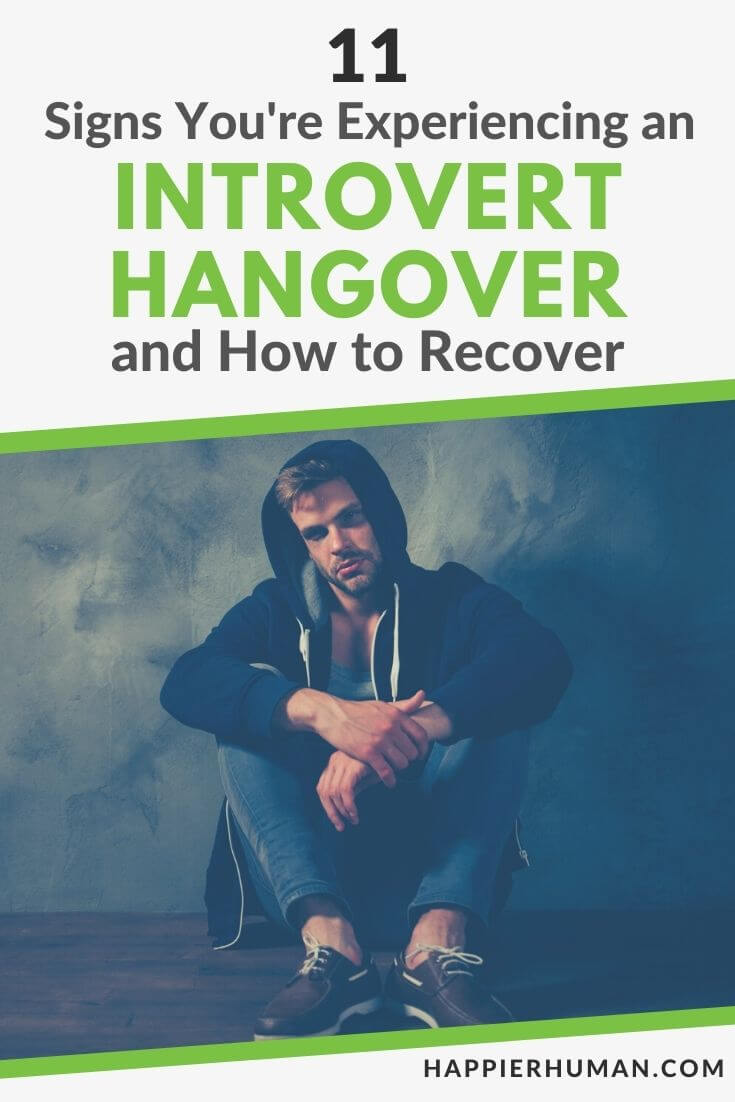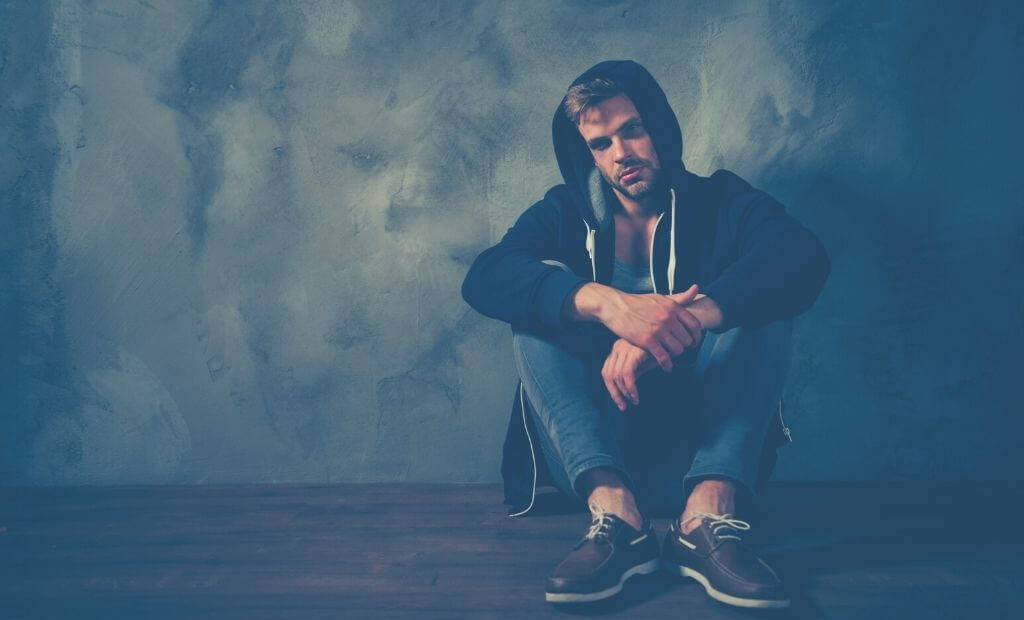There might be affiliate links on this page, which means we get a small commission of anything you buy. As an Amazon Associate we earn from qualifying purchases. Please do your own research before making any online purchase.
The weekend has arrived and the possibilities are endless for social activities. While I am looking forward to spending time with friends, I’m not looking forward to that tired, drained feeling afterwards. It feels like a hangover.
If you've ever felt like this, you’re not alone. We are having a hangover – an introvert hangover.
In this article, I'll define what an introvert hangover is, list tell-tale signs, and offer prevention and recovery tips.
(Side note: One of the best ways to increase your happiness and life satisfaction is to plan your day, so you focus on your TOP goals. To get started, watch this free video that details the 7-minute habit for planning your day to focus on what's important.)
What You Will Learn
What is an Introvert Hangover?
Because introverts get energy or self-care from being alone, socializing can be physically and emotionally depleting. An introvert hangover is that drained, tired, overwhelmed feeling you get when you've “overdone” socializing and have not had enough alone time to recharge. It can come from small group interactions, overstimulation from the activity itself, like an eventful concert, or a Zoom call.
First, let's acknowledge that there's nothing wrong with being an introvert. Not only should we celebrate our wonderful characteristics, others should value them too!
We may be seen as aloof or stand-offish. We're not either or necessarily shy, we just get our energy and self-care from being alone.
We don't hate people. Our alone time is how we are all of the wonderful things that make us who we are.
You may notice that it's your friend who is an introvert that listens the best. We crave more intimate and deeper conversations and interactions. We “get” you because we really want to know the answer when we ask, “How are you?” We listen and have a great gift for empathy.
This positive attribute follows us into the workplace. You may argue that extroverts and introverts contribute equally in the office. But because we listen more than we talk, we tend to be better listeners. We give everyone a chance to be heard and take in other's ideas.
Although we prefer to work alone, we make better team players because we care about what others think and don't want to be perceived as not doing our part, so we put in a lot of work.
We may get overlooked at work, which isn't a good thing. But while others are at the water cooler mingling, we're sitting alone getting lots of work done, or thinking up some great ideas for the next project or to solve the current or an ongoing problem.
Thing is, you may never realize it was us who came up with it. We don't do as good of a job as extroverts at “tooting” our own horns. We're like the silent partner. If it weren't for us, things couldn't happen as well as they do.
I may even argue the company couldn't exist without us. You may be surprised at all the famous people who are introverts.
We're creatives. We're artists, singers, painters, word-smiths. We also tend to work well under pressure. We're usually calm and think before we act. So if there's an emergency, we're quietly considering all the possibilities instead of panicking and acting impulsively.
With that being said, it is important for us introverts to sometimes step outside of our comfort zone. We can miss out on opportunities to meet new friends or expand our network.
We may not receive invitations to social gatherings or may decline them, missing out on events we may have enjoyed, and the chance to make new friends, or build business relationships and career paths.
It's also harder to get over the loss of a friendship. We value close relationships with a few friends, instead of having large numbers of people in our circle. And since we're not “out there” making and building new acquaintances like extroverts, it's difficult to meet new friends.
We may not thrive on large group interactions, but we love our handful of close, meaningful relationships. I found this article on apps for introverts to find friends or romantic partners helpful.
With these apps, we can grow our network and stretch our comfort zone a little. But we can do so in the safety of our own space. We can venture out when we're ready to meet that new companion.
Everyone is different, but here are 11 signs you're experiencing an introvert hangover and how to recover.
11 Signs of an Introvert Hangover
1. Tired
After socializing, you feel so tired you don't have the energy to do anything else. You take a nap, sit on the couch for hours, or skip your normal routine and go straight to bed. As contradictory as this may seem, you may even be too tired to fall asleep.
2. Zoned Out
Hello. Earth to introvert. You can't hear what anyone is saying anymore. You're checked out, and the look on your face shows it. It's blank. You may even be daydreaming.
3. Can't Focus or Distracted
This is like being zoned out. The slightest thing derails you from the task at hand. A loud noise in the background or a beeping phone breaks your concentration and distracts you easily.
While you would normally just check the text message and resume what you were doing, a hangover makes it hard to get back on task.
4. Foggy Mind and Indecisive
You don't seem to be able to think clearly. You can't focus enough to make decisions, big or small.

It's like your recall is behind a foggy haze and you can't see the picture clearly enough to identify the details.
5. Numb and Not Yourself
You feel unlike your normal self. You appear aloof and lifeless, although that description couldn't be further from the truth.
6. Physical Symptoms
Just like with an alcohol hangover, you have physical symptoms. You may have a headache, stomach ache, or feel dizzy.
7. Anxious
You start to feel nervous or like you want to run away from the social event. You worry that others are judging what you say or do. Afterwards, you feel agitated, or worry about things you said or did when socializing.
For some people, that anxiety is present with or without a hangover. Too much socializing exacerbates it.
8. Irritable
You're a grumpy gus. Smaller stressors like losing your phone or an insensitive side comment from a friend send you into an emotional outburst. You feel like you're having a meltdown over something that wouldn't usually affect you this much.
You may get into your biggest, most heated arguments during a hangover.
9. Detachment
You feel disconnected from others and have a strong need to be alone. You may cancel all upcoming plans and bask in the glory of binge watching your favorite TV show or having a meal alone. You isolate yourself completely or only allow a significant other in your personal space.
10. Can't Find the Words
You're not usually at a loss for words, but now, all of a sudden, you are. All of your small-talk brain cells have disappeared.
On the other hand, you may feel the need for a deeper conversation with more sustenance.
11. Jumpy
You're overly reactive. You're so jumpy you startle easily. You may jump when your phone rings or someone comes into the room.
Let's Be Proactive: 4 Ways to Prevent an Introvert Hangover
1. Triggers and Energy Levels
Identifying what triggers a hangover can help you feel more in control and proactively plan management techniques or coping skills.
Everyone is different. A work function may be a trigger for some. For others, it may not be the function itself, but how long it lasts, or attending multiple functions back-to-back.
Be aware of your energy-level capacity. Are you more energized in the mornings, afternoons, or evenings? If you can't plan social events when you're most able to handle them, prepare yourself before or after.
2. Set Boundaries
It's okay to reschedule. It's even okay to say no.
An evening for drinks at the bar and a full-blown wedding ceremony and reception may not be so overwhelming if they are not back to back, or if you have time alone to charge before each event.
You can let loved ones know how you tick; that you need your alone time to be your best self. As a matter of fact, if they don't already know, you may want to have a conversation with them soon.

This way, when you reduce the number of interactions on your schedule by suggesting the Friday get together switch to Sunday, or you choose not to attend at all, loved ones may be less likely to take it personally.
3. Schedule “Me-Time”
Be proactive. Schedule alone time before or after a social event, or anything that may provide too much stimulation. The comfort of knowing you will have this time alone may ward off a hangover.
At the least, it gives you that time you need to replenish. If that work meeting or conference call is today, this may not be the evening to head over to the in-laws or your brother's for that big family dinner.
4. Make an Appearance
If you must attend anyway, or you really want to participate, you can “ration” yourself off, so to speak.
Drinks and dinner can be drinks only or dinner only. You can gracefully bow out while the night is still young.
And if it's harder to walk away from family gatherings early, arrive later, so parting too early won't bring such sweet sorrow.
6 Ways to Recover from an Introvert Hangover
1. Focus on Self
All recovery efforts fall under self-focus, since we get energy or recharge from being alone. You can start by letting friends and family know you're taking the break you need to recharge and return your best self.
Let the self-care begin! Indulge in your favorite hobbies. Do something alone that you enjoy. Whether it's painting or listening to your favorite music, do what re-energizes you and makes your introvert hangover disappear.
If you feel you're all “hobbied” out, this article by “Develop Good Habits” has some great suggestions.
2. Take a Break from Outside Stimulation
Texting, Instagram, and social media in general is still interaction with others. Put the phone away. You may even want to turn off the tv. Do something quiet and calming. Just spend time with you.
3. Move the Body, Calm the Mind
Mindfulness, calm activities and exercise can go a long way in restoring a drained soul.
Mindfulness brings you into the here and now. This state of consciousness means being aware of what you're feeling in the moment and experiencing it without judgement.
Use your five senses to practice mindfulness.
What colors do you see? What sounds do you hear? If you're eating or enjoying some hydration, what does it feel like on your tongue? How does it feel to take your shoes off and dig your toes into the bare floor? When you inhale, do you smell your neighbor's dinner cooking, your body wash, or your roommate's hair spray?
It's hard to worry about things that happened while you were socializing, or feel anxious about upcoming social interactions, when you're actively, intentionally experiencing the here and now.
Although exercise may not seem like a calm activity, it can be helpful at countering cortisol, the stress hormone that can make you feel jumpy. You can do something that gets the body moving gently, like yoga.
4. Balance Socializing and Alone Time
This can be used to prevent and recover. If you have multiple events in a day, take a short break in between.

Can you take a quick nap? Maybe you can have a long bath to transition from work to evening obligations. A lunch by yourself with a good book or some deep breathing to lead you into the rest of your work day may reduce or prevent social exhaustion.
Just knowing you've scheduled some alone time may ward off that hangover.
5. Talk to a Trusted Person
Even as introverts, we are still social creatures. Talking to a therapist or loved one about how you're feeling may help. Choose someone who is non-judgmental.
6. Journal
Journaling is always a good way to get in touch with your feelings. It's also a record you can refer back to and determine your triggers.
You can go back and read which events caused you to feel the need to disconnect. You may identify a pattern of your energy cycle. Have you noticed it's mostly work events that you're writing about, a certain time of day that starts the social exhaustion symptoms, or a particular type of event?
You may also discover some self-care hobbies are better at re-energizing you than others. Journaling is your window into yourself.
Final Thoughts on an Introvert Hangover
Whatever you do, don't feel bad about needing or spending time alone. Don't over explain to others that you need alone time to be your best self. And definitely don't apologize for who you are.
Maybe there's one more thing I need to add to the Recovery List. Laughter. Laughter is always healing — for an introvert, extrovert, or someone in between. While you're nursing that hangover, or implementing prevention techniques, check out these 31 funny introvert memes to help you recharge … … all by your wonderful, introverted self.
Finally, if you want to increase your happiness and life satisfaction, then watch this free video that details the 7-minute habit for planning your day to focus on what's important.


